In 1999, when the seven giants of Big Tobacco testified before Congress that nicotine was not addictive, America was only beginning to wake up from a century of lies from that addiction-for-profit industry. Although we knew that tobacco had caused lung cancer for decades, it took us years to feel the true effects of that industry and bring it to account.

Now that marijuana is being rapidly normalized and commercialized, we should learn from our past mistakes.
Too many Americans understand pot as an innocuous, low-potency joint smoked as a rite of passage in high school or college. But the reality of today's marijuana — and its active ingredient, THC — is far different. In fact, the marijuana of yesteryear had an average THC content of around five percent — with today's "legal" marijuana sometimes reaching 99.9 percent purity. This is most certainly not your Woodstock weed.
Today's pot industry players are copying the playbook of their Big Tobacco predecessors. They're selling and marketing kid-friendly, THC-infused gummy bears, candies, ice creams and sodas. They are hiring major lobbying firms and ex-politicians to raise their stature both in Washington and in various state capitals. They are teaming up — and in many cases merging — with the growing vaping industry by producing marijuana concentrates, otherwise known as waxes, shatters and dabs.
From years of research done on low-potency marijuana, we know prolonged use of the drug can severely impact young people's ability to learn, lower IQ, and impair memory. We also know that it can lead to the development of severe mental illness, such as psychosis. A recent study found that daily users of lower-potency marijuana were three times more likely to be diagnosed with a first episode of psychosis compared with non-users. This risk increased to five times with high-potency marijuana use. Researchers from Europe found that one in two new cases of psychosis in Amsterdam were due to highly potent marijuana.
To add insult to injury, we also know that unlike tobacco, marijuana impairs judgment, motor skills and reaction time — which makes it incredibly dangerous to use before driving a vehicle or showing up to work. Marijuana-impaired driving deaths have doubled in states that have legalized the substance, and according to a recent report from Quest Diagnostics, workers are testing positive for marijuana at skyrocketing rates. This includes an increasing number of transportation workers (like the limo driver who killed himself and 19 other people in New York's deadliest crash last year).
Voters were sold a line when they were told that legalization of marijuana would lead to the end of the black-market trade of pot. Instead, legalization has been a boon for criminal gangs and foreign cartels. These bad actors are using the cover of state "legal" status as a shield while they set up elaborate growing operations in housing developments and on federal lands. The governor of California, Gavin Newsom, is deploying the National Guard to help shut down the out-of-control illegal market in that state — even though marijuana has been sold on the "legal" market for years.
Some marijuana lobbyists claim that their quest for policy change is about social justice. But legalization is the ultimate injustice — with a disproportionate number of pot shops popping up in poor communities of color compared with other neighborhoods. The average rate of youth arrests in Colorado, for example, has gone up since legalization; the promises of equity have simply failed to materialize. Moreover, arrest disparities continue in legalized states. No, we should not arrest and lock up people for smoking a joint, but we need not commercialize marijuana to reform our current marijuana laws and make them fairer.
Big Marijuana isn't just like Big Tobacco — there are now actual major tobacco conglomerates involved in cashing in on pot. Altria, the maker of Marlboro cigarettes, recently invested billions of dollars into a Canadian marijuana grower and has purchased a large stake in Juul (which itself is an offshoot of a marijuana vaping company at the root of today's youth vaping epidemic). And you just can't make this up: the former head of Purdue Pharma, who oversaw the deceptive marketing of OxyContin, became the head of a Canadian marijuana company.
Our country must begin to see through the smokescreen perpetuated by the marijuana industry and its well-heeled lobbyists, and view marijuana legalization for what it is: a new addiction-for-profit industry set on raking in billions of dollars while public health and safety suffer.
As the old saying goes, fool me once, shame on you; fool me twice, shame on me.
Kevin Sabet is the president of Smart Approaches to Marijuana, which he founded with former U.S. Rep. Patrick Kennedy. He is also a three-time White House drug policy adviser.
The views expressed in this article are the author's own.
Uncommon Knowledge
Newsweek is committed to challenging conventional wisdom and finding connections in the search for common ground.
Newsweek is committed to challenging conventional wisdom and finding connections in the search for common ground.
About the writer
To read how Newsweek uses AI as a newsroom tool, Click here.








